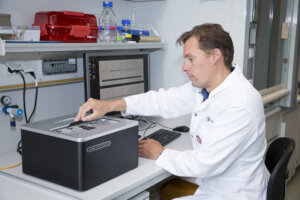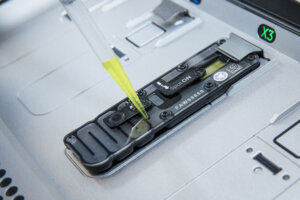New approaches in the diagnosis of childhood brain tumors
Brain tumors are one of the major challenges in pediatric oncology. They are characterized by an enormous biological heterogeneity and are at the top of cancer-related mortality rates in children due to their often aggressive course. Professor Dr. Ulrich Schüller and his team from the Research Institute Children's Cancer Center Hamburg, in close collaboration with other research groups, including the University Medical Center Hamburg-Eppendorf (UKE) and the University Medical Center Schleswig Holstein (UKSH), have succeeded in bringing a new diagnostic method into clinical use that could soon substantially improve the care of patients with brain tumors. The study results are now published in the journal Clinical Chemistry (Oxford University Press).
Liquid biopsy enables precise molecular tumor classification
The gamechanger is a technique called nanopore sequencing - a safe and gentle method that detects tumor signatures on cell-free DNA (cfDNA) from the patient's cerebrospinal fluid (CSF). It detects tumor-specific changes in copy number profiles and epigenetic changes in DNA, which - after comparison with large databases - enable precise molecular classification. Whereas complex and risky neurosurgical interventions such as tissue biopsies or resections were previously necessary, with this method, researchers only need a few milliliters of brain/spinal fluid. "Thanks to the CSF biopsy method, we can make a reliable diagnosis - without any stressful intervention for the child," explains Prof. Dr. Ulrich Schüller, also referring to patients with inoperable tumors for whom even a tissue biopsy is associated with a particularly high risk, e.g. those with tumors of the brain stem. Here, the novel cerebrospinal fluid analysis provides diagnostic certainty. "In the case of tumors that must and can be operated on, the preoperative diagnostic method also enables us to plan surgical interventions more individually and align them with the tumor entity," adds Ulrich Schüller.
Since the new method also provides evidence of residual disease or relapse, Ulrich Schüller and his colleagues are optimistic that nanopore sequencing of cfDNA from cerebrospinal fluid samples will also be an important component for monitoring children with a brain tumor in the future. Conceivably, chemotherapies and radiation could be resumed as soon as a relapse is detected via the cerebrospinal fluid - and not only when clinical symptoms or evidence is found in imaging. The technology will be implemented in clinical trials in the medium term to randomize patients based on molecular results of CSF diagnostics. Results of the study data, which includes 129 CSF samples from a total of 99 patients, can be read here
Data cast their shadows ahead. Research awards in advance of publication
The relevance of the data is demonstrated by no less than three research prizes awarded to the scientists of the Research Institute Children's Cancer Center Hamburg in the run-up to publication. For example, Professor Schüller received the 2023 Science Award from the German Society for CSF Diagnostics and Clinical Neurochemistry (DGLN). In addition, Ann-Kristin Afflerbach from the Schüller research group was awarded the Young Investigators Bronze Award at the 13th ISMRC (International Symposium on Minimal Residual Cancer). In addition, the doctoral student recently received the coveted Hubertus Wald Young Investigator Award from the University Cancer Center Hamburg (UCCH).
Original publication
The data are published in the current issue of the journal Clinical Chemistry. Click here to access the publication


New approaches in the diagnosis of childhood brain tumors: Nanopore Sequencing
















